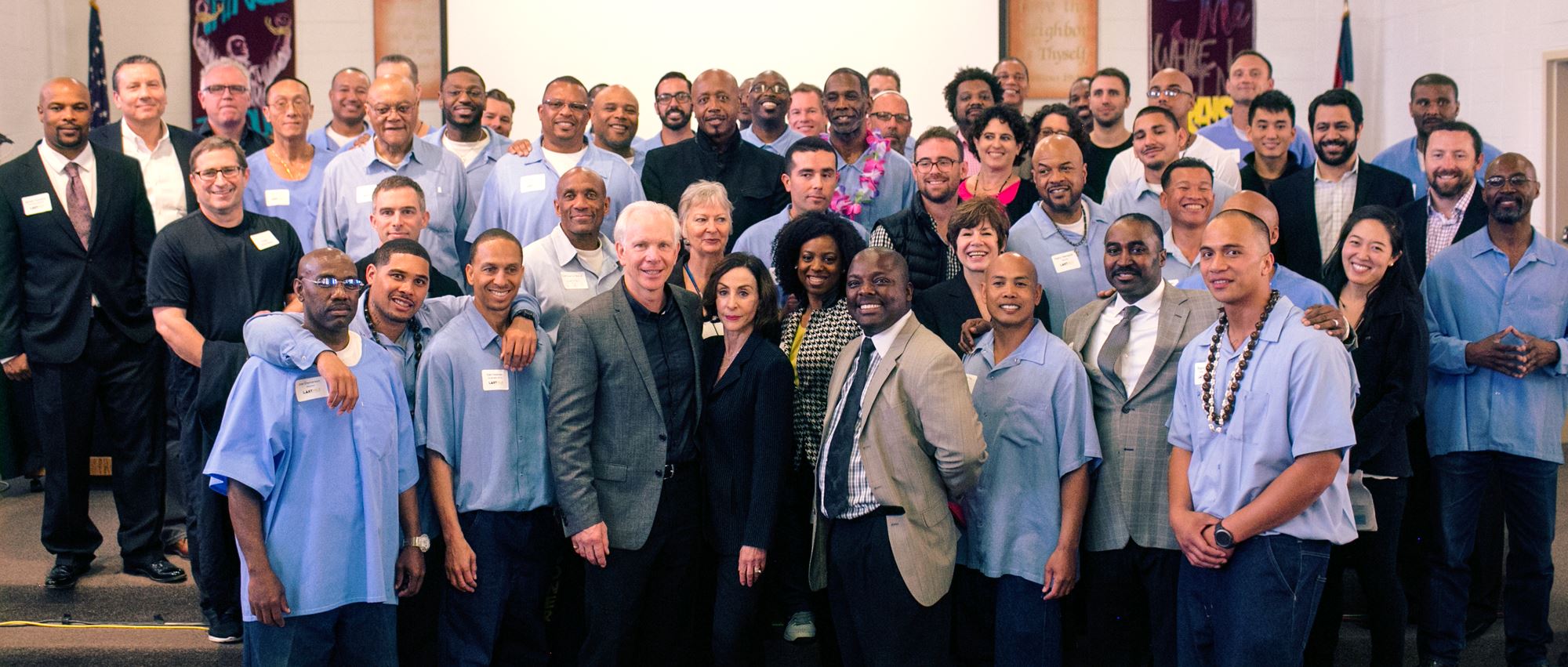


For Peter Stern, work is all about return on investment. At Alibaba Group’s San Francisco office, he spends his days combing through potential acquisitions to make sure the company gets the biggest bang for its buck. But outside the office, where he teaches inmates at San Quentin State Prison about e-commerce, he’s aiming for a return rate of exactly zero.
Zero because that’s the rate of recidivism he hopes he continues to see among his students. And the work he does with The Last Mile, a nonprofit organization in San Francisco that teaches computer skills to prisoners at San Quentin State Prison, has helped to deliver that return consistently.
The Last Mile
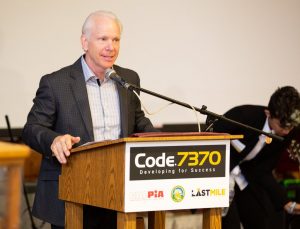


Established in 2011, The Last Mile was founded by two Silicon Valley veterans, Chris Redlitz and his wife Beverly Parenti, who are prominent venture capitalists and philanthropists in the Bay Area. They started a business-accelerator lab at San Quentin after Redlitz’s first visit to the facility in 2010, when he was invited to talk about entrepreneurship. The caliber and passion of his audience took him by surprise, he says.
“These were smart and knowledgeable men who were asking really smart questions. There was no question whatsoever that they wanted to turn their lives around,” said Redlitz, who still gets red-eyed and emotional when recalling the visit, which he described as “life changing.”
Parenti said the more they learned about the plight of the U.S. prison population, the more their desire to help. “Somethings got to be done,” she said.
America Behind Bars
With 327 million people, the U.S. accounts for 5% of the world’s population. But the country houses 20% of the world’s prisoners, according to a 2015 report by Institute for Criminal Policy Research.
Keeping people in prison is a costly burden on American taxpayers. The Federal Bureau of Prison under the Department of Justice reports that the annual cost of incarceration per federal inmate is $32,309. For some states, the cost is even higher.
In California, the state government spends approximately $71,000 on each prisoner per year. That’s higher than the annual average cost of living for a single person in San Francisco ($69,072) the most expensive city in which to live in the U.S. It is also 38% higher than the yearly average cost to live as a single person in New York City ($51,323).
Trapped in a Vicious Cycle
Redlitz won’t make excuses for his students. They are living the consequences of the crimes they committed. But he stresses that a crime shouldn’t define a person for the rest of his life, not when many repeat offenders “have no other way to take care of themselves or their families,” he said.
The most recent report by Prison Policy Initiative puts the unemployment rate among former prisoners at about 27%, higher than the U.S. unemployment rate during the Great Depression. According to a Bureau of Justice Statistics report released in May, 68% of released state prisoners were arrested within three years, 79% within six years and 83% within nine years.
“So why not teach them a skill so that they can do something good with it? It takes them off the streets, and they can contribute to the society,” Parenti said.
By reducing the rate of recidivism, the money that would have otherwise been spent on housing prisoners could go toward education and programs that help people stay out of prison, she added.
With Redlitz and Parenti lending their voices to the issue, The Last Mile has attracted a number of other Silicon Valley names as well, such as those from Google, LinkedIn, Microsoft and Facebook, celebrities such as MC Hammer and a handful of local volunteers such as Stern to lend a helping hand. That includes giving donations, serving as guest lecturers and what the nonprofit wants most: giving the program’s graduates a chance to try out their new skills on the outside.
Code for Life
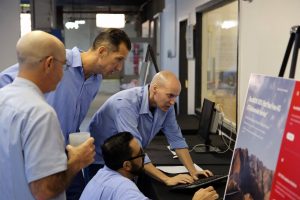


The Last Mile’s signature program is Code 7370, which teaches prisoners about coding languages, such as HTML, Javascript, SCC and Python, as well as data visualization and user-interface, web and logo design. The program is a collaboration among The Last Mile, the California Prison Industry Authority and the California Department of Corrections and Rehabilitation.
For Chris Schuhmacher, the program was the lifeline he never dreamed possible, especially when he was dealing marijuana and getting high on the streets of Los Angeles more than two decades ago. One day, in a heated altercation, Schuhmacher killed a man. The judge handed him a life sentence.
“Prison was hard, but it was the wake-up call that I needed,” he said.
Inside his windowless cell, day after day, month after month, he was forced to face his demons and figure out a way to undo the damage he’d done, including hurting his mother and sister, who never gave up on him. His decided that he may not be able to change his past, but he could build a new future.
By enrolling in the The Last Mile and putting in thousands of hours of hard work, grinding away on the computer and devouring one coding book after another, Schuhmacher was able to discover a new talent for programming, math and building algorithms, which ultimately led to him to build his own app.
Called “Fitness Monkey,” the app was designed to help people kick addiction through physical exercise. It won him accolades and financial backing from real investors. Moreover, it paved the way for his current job as a software engineer at Fandom, a San Francisco-based content-creation company.
Thanks to early parole, Schuhmacher is one of many dozens of The Last Mile graduates to find a job after serving their time. For him, it was 16 years.



Chrisfino Kenyatta Lealwas a high school dropout who served 19 years of a life sentence, which came as a result of California’s three-strikes rule. But now he works at shared-workspace provider Rocketspace. He started doing “campus service,” which meant scraping gum off the floor. His hardworking attitude was recognized and eventually he was promoted to business-development manager. His current job: the reentry manager at The Last Mile, which helps ex-convicts adjust to life on the outside after time in prison.
Another success story is Anouthinh Pangthong or Choy, as he likes to be called. The Laotian refugee, who spent 22 years in San Quentin for murder, said learning how to build and design a website has taught him about actions and consequences. Each part of the website-building process will impact what comes next, he said, so it forced him to think a few steps ahead.
“I was so impulsive and reactionary before. So hot headed,” he said. “But now, I learned to dissect my actions and process each of my life’s choices.”
Currently, Choy works as an Outreach Associate for Re:store Justice, an NGO that promotes prison reform, and as a hip-hop choreographer.
Re-Programming the Mind and Heart
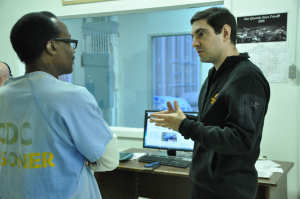


The skills that Stern and his fellow lecturers teach are giving the marathoners in the The Last Mile program a pair of high-performance running shoes. Plus, there’s an aspect of cheerleading to the work, too.
“I teach about Alibaba, e-commerce and China. But maybe more important than classwork is demonstrating belief and sincerity to instill confidence,” Stern said.
Parenti said when Stern speaks to the inmates, whether in a group or one-on-one, “he is not just telling what they can do better. He is talking to them about owning who they are and being proud of their accomplishments.”
The Last Mile students are not stereotypical prisoners, Stern said. They may have made terrible mistakes, but they have taken responsibility and now show a “powerful determination to make amends.”
Shared Values
The Last Mile’s belief that everyone deserves a chance to succeed is also a conviction deeply rooted in Alibaba, an internet and e-commerce giant known for being the champion of small businesses in China. The company’s culture emphasizes standing with “the little guys,” Stern said. And Alibaba employees are required to donate time each year to a social cause of their choice.
Similar to The Last Mile, Alibaba’s education arm, Taobao University, also holds regular courses at the Qiao Si Prison in Hangzhou, where the company is headquartered. The classes teach inmates about e-commerce and how to run an online business after they have served their time.
A representative from the prison said that for many ex-convicts in China, even though they were able to gain a job skill during their incarceration, still have a hard time finding employment because of their prior record. That leads many of them to e-commerce as an ideal way to get a fresh start.
“There are many shared values between The Last Mile and Alibaba. [Alibaba Group founder] Jack Ma frequently says that Alibaba stands for the underdogs. The Last Mile students are the ultimate underdogs,” said Stern.
Giving Back and Looking Forward
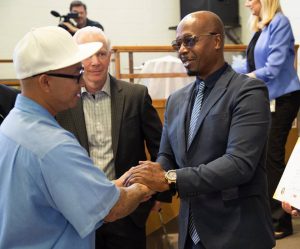


For many of The Last Mile’s graduates, the program has opened doors that were once closed to them because they came from communities that didn’t inspire a future in the tech world.
“Growing up, many of [the inmates] didn’t have any professionals to look up to. There were no doctors or lawyers or computer programmers,” Parenti said. “All the ones with cars and the bling were the guys on the streets dealing drugs. They were the people others aspired to be.”
To break that cycle, many alumni have gone back to their old neighborhoods to be the positive role model that they didn’t have when they were growing up.
“These graduates are in a unique position because they can go back to the neighborhood as successful people and impact others,” said Redlitz.





